Episode 412: The Flowering of Brooklyn with Molly Oliver Flowers, plus our State Focus: New Hampshire
July 31st, 2019
Podcast: Play in new window | Download
Subscribe: Apple Podcasts | Podcast Index | RSS | More
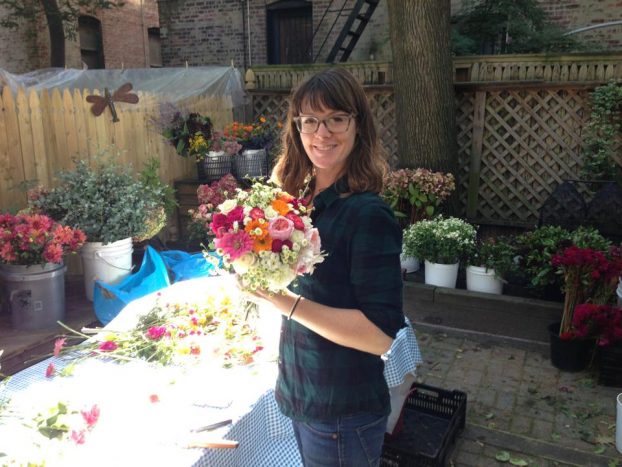
In October 2014, I took a trip to New York City where I made the editorial rounds to introduce Slow Flowers to members of the media (remember, the online directory launched earlier that year). At each of these meetings, I unveiled the first of what has since become the annual Slow Flowers Floral Insights and Industry Forecast.
And then, of course, as I love to do whenever I travel, I gathered with a group of Slow Flowers members to meet them, hear about their journeys, learn what encourages and even challenges each of them in them in their floral enterprise.
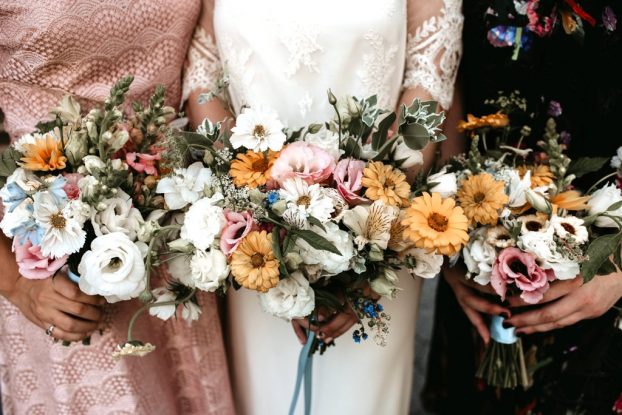
The woman who generously helped me find a location for this gathering, and who brought beautiful flowers to the first-ever New York area Slow Flowers Meet-Up was Molly Oliver Culver, today’s guest.
A small, dynamic group of florists and growers joined us that night. And after the party wrapped, Molly agreed to stay for an interview for the Slow Flowers Podcast. We sat in the rather dark, brick-lined upstairs room of a Brooklyn eatery and recorded the conversation which you can hear from the Slow Flowers Podcast archives – episode 172, which originally aired December 17, 2014.
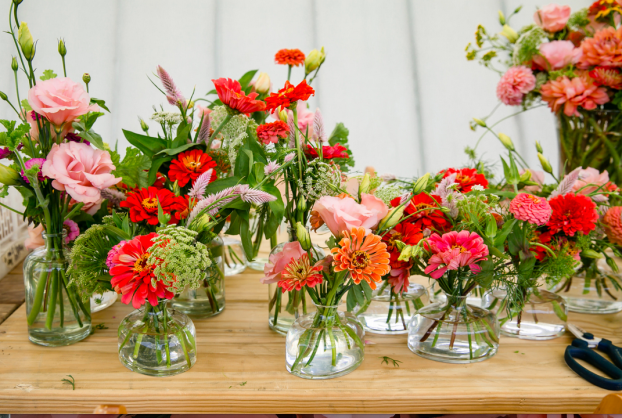
Today, we’re catching up with Molly and I’m so pleased that she has returned to talk about the changes in the local floral landscape in New York and Brooklyn, where most of her clients’ wedding ceremonies take place, and in the surrounding areas such as Hudson Valley, further Upstate New York, and on Long Island, where most of the local flowers for Molly’s designs are grown. So much has changed in five years and it’s so encouraging – I’m excited to share this conversation with someone I consider a Slow Flowers pioneer and valuable friend.
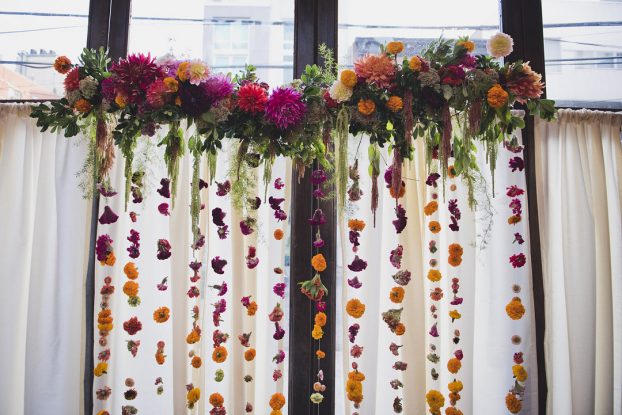
Here’s more about Molly Culver and Molly Oliver Flowers:
Molly Oliver Flowers is a sustainable floral design company founded in 2011 by farmer/educator, Molly Oliver Culver. She has been recognized by Brides.com as one of the top five wedding professionals using sustainable practices and was featured on the list of best sustainable florists in NYC by Ecocult.
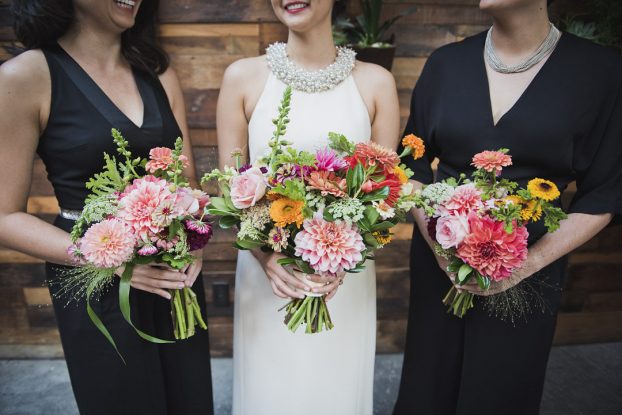
Molly writes this on the “about” page of her web site:
A desire to help grow social justice and care for our beautiful planet led me to community organizing around food justice, then to rural organic farming, and eventually, to education and flowers. I’m proud to say I’ve helped to nurture soil, and have grown my own food and flowers, on my own and with others, for the past 15 years.
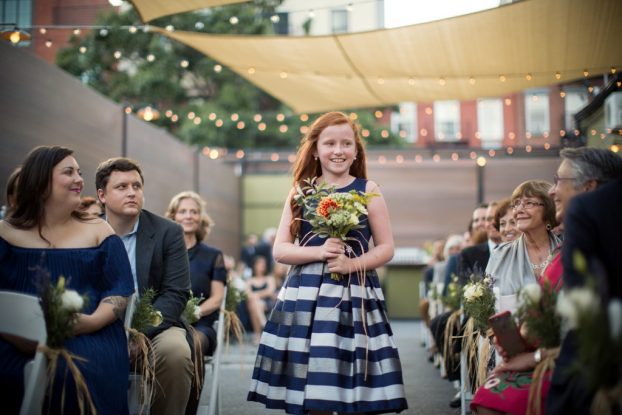
I love that floral design allows me to meet fun, loving and mindful clients and connect them with seasonal flora and our local flower, herb, perennial and foliage farmers. I’ve had many lives in my 38 years: Audrey Hepburn/NYC-obsessed teenager; literature major; novice journalist and ESL instructor in Santiago, Chile; urban farming educator and farmers market manager; community garden outreach coordinator; compost educator; urban farm manager…and now, a business owner and floral designer.
Throughout these many experiences, the connective tissue has always been people, soil, and plants. At core, I care deeply about equity, inclusion, sustainability and loving kindness and works to help these values emanate through this business.
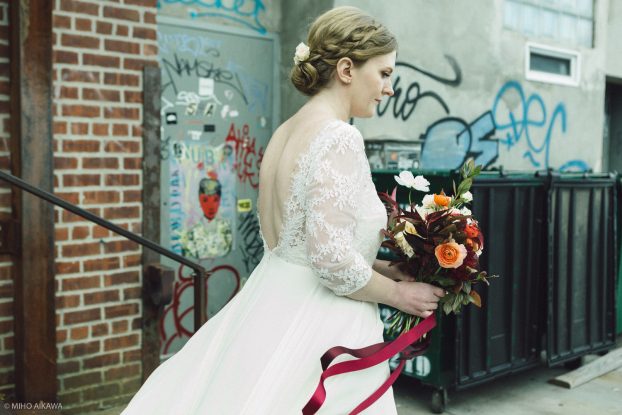
Molly Culver on her design style:
I continue to be deeply inspired by all of the local blooms and foliages, from cultivated to wild and foraged, that any given season has to offer. Our region’s climate and four-season evolution offers something just right for every occasion, all year round. I am interested and inspired by my clients’ vision, and whenever they are needing guidance, I’m happy to share my love of wild, natural designs. In other words, I love to bring your vision to life using the gorgeous product we have available locally.
Molly Culver on “Why Local?”
I love to connect my clients with locally grown flowers, to share the fun of learning about what’s in season at the time of their event, and to create gorgeous arrangements that evoke time, place, mood and my clients’ individual style.
I source 90-100% of the flowers we use within 200 miles of New York City, from both regional and urban farms. An organic grower of 10+ years myself, I love supporting the talented community of dedicated farmers who grow an incredible diversity of beautiful flowers, cut days or even hours before, and delivered at peak quality to the city. Collaborating with these new growers to share experiences, discuss trending varieties and colors, and celebrate our successes is one of the most exciting aspects of this work.
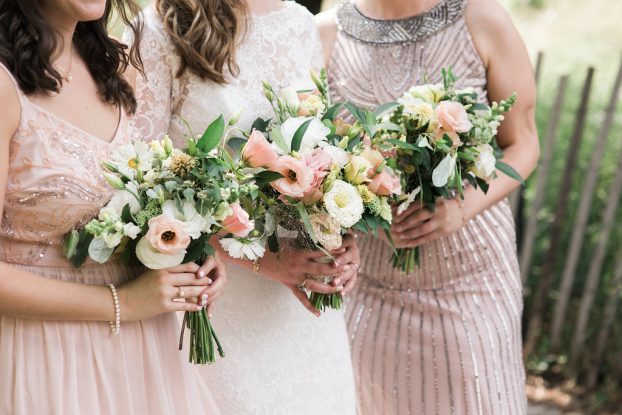
In the studio and for her events, Molly puts a priority on waste reduction and composting. Here are some of her practices, which I hope inspires change in your studio or shop:
Emphasis on waste reduction and composting:
It’s par for the course in the NYC event world to throw away much of the decor at the end of the night — this waste (vases, flowers, candles, etc.) winds up in a landfill.
Unfortunately, many flower studios still rely heavily on floral foam and other synthetic, non-biodegradable products to create designs — all of this goes into landfills as well. Need I go on?
There are a number of ways I work to reduce waste, both in my day-to-day work in the studio and on event days:
–I offer a variety of vessels as rentals, and re-use these as long as possible.
–I make complimentary ‘grab and go’ bouquets for your guests, and generally ensure you and your guests go home with as many peak quality flowers at the end of your event as desired.
— All unclaimed flower waste is composted locally at urban farms and becomes a nutrient-rich soil amendment.
–All items not accepted by NYC’s municipal recycling program are recycled through a partnership with Terracycle
–Much of the cardboard and paper packing and packaging from vessel shipments is re-purposed or recycled.
–I avoid all use of synthetic floral foam or other non-biodegradable products and chemicals.
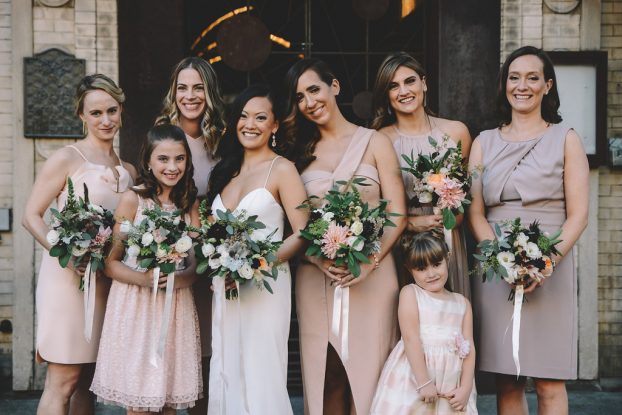
Learn more about (and follow) this wonderfully inspiring creative floral artist at these social places:
Molly Oliver Flowers on Facebook
Molly Oliver Flowers on Instagram
Thank you so much for joining me today as we visited Brooklyn’s Molly Culver. I learned a lot and appreciate hearing Molly’s timely update about one of the most important markets for local and seasonal flowers. Molly is in an influential marketplace and her devotion to the Slow Flowers Movement is essential to the cause.
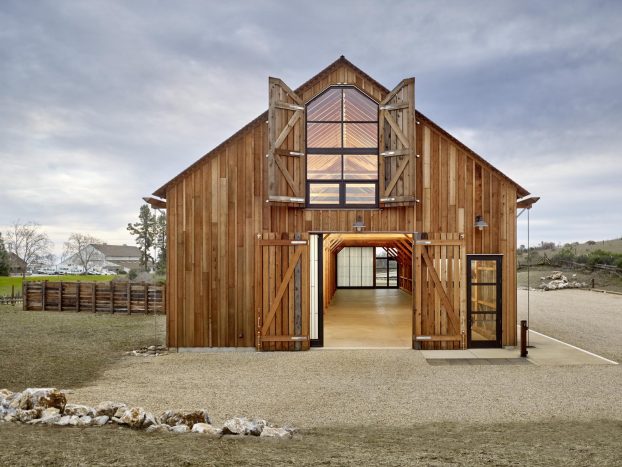
You may have picked up on the fact that I’m lobbying to bring Molly to the 2020 Slow Flowers Summit, which will take place at the Center for Agroecology and Sustainable Food Systems. As Molly is a graduate of that program at University of California, Santa Cruz, I’m eager to involve her and together we are brainstorming a panel on the influences of sustainable flower farming for the farmer-florist. Watch this space and I promise you’ll hear more details soon.
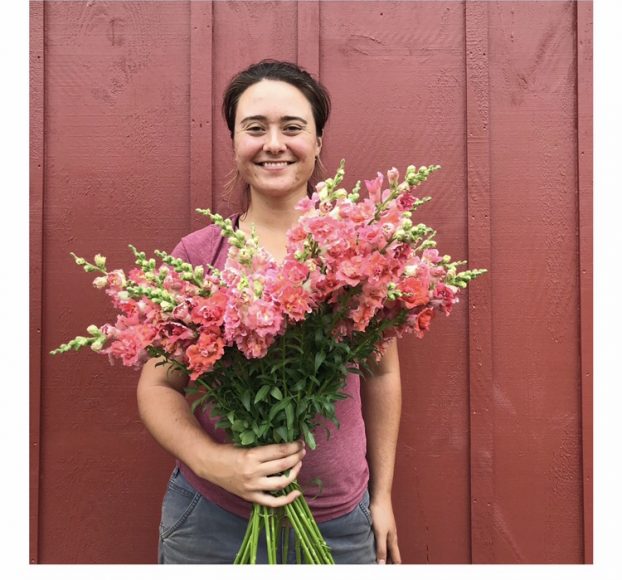
Our theme for 2019 – Fifty States of Slow Flowers – continues today with Maegan Williams of Gilsum Gardens, based in Gilsum, New Hampshire. Gilsum Gardens was founded by Barry Williams and Barbara Kelly in 1993 and is now run by dad Barry and daughter Maegan.
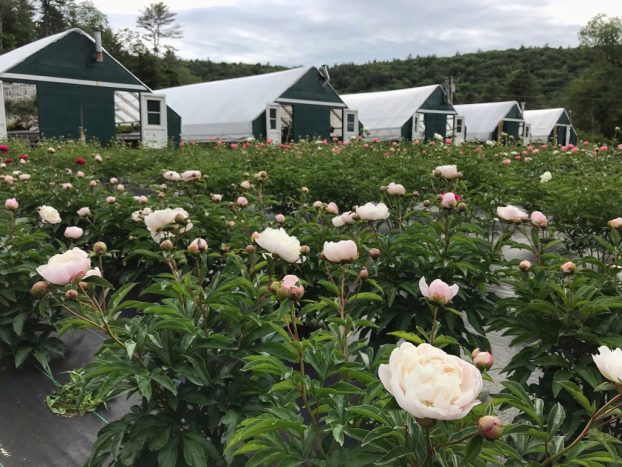
Maegan explains: Possessing no formal education in horticulture, I chose the family business after much consideration of nearly any other profession. About the time I realized I couldn’t picture my life without greenhouse season, I fell in love with cut flowers. What I lacked in classroom hours I made up for in my unique life experience of growing up in my parents’ greenhouses and countless hours spent roaming our woods and acreage. I have loved building upon and diversifying what my parents created, and feel fortunate to be guiding the business forward into its next chapter balancing seasonal nursery plants and specialty cut flowers for wholesale customers.
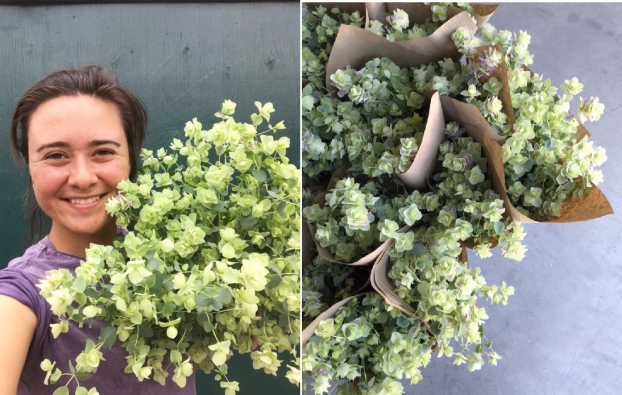
You’ll want to find and follow Maegan and Gilsum Gardens at these social places:
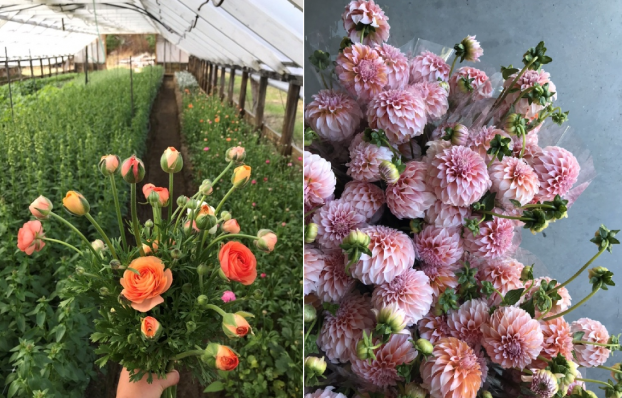
As our movement gains more supporters and more passionate participants who believe in the importance of the American cut flower industry, the momentum is contagious. I know you feel it, too. I value your support and invite you to show your thanks and with a donation to support my ongoing advocacy, education and outreach activities. You can find the donate button in the column to the right.
THANK YOU TO OUR SPONSORS
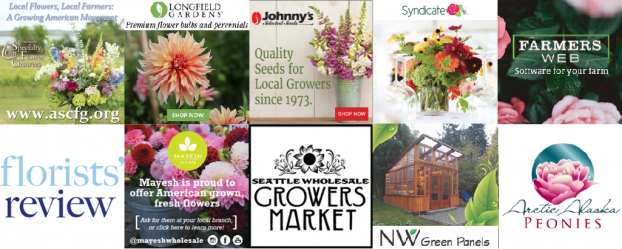
Florists’ Review magazine. I’m delighted to serve as Contributing Editor for Slow Flowers Journal, found in the pages of Florists’ Review. It’s the leading trade magazine in the floral industry and the only independent periodical for the retail, wholesale and supplier market. Take advantage of the special subscription offer for members of the Slow Flowers Community.
The Association of Specialty Cut Flower Growers. Formed in 1988, ASCFG was created to educate, unite, and support commercial cut flower growers. It mission is to help growers produce high-quality floral material, and to foster and promote the local availability of that product. Learn more at ascfg.org.
Johnny’s Selected Seeds, an employee-owned company that provides our industry the best flower, herb and vegetable seeds — supplied to farms large and small and even backyard cutting gardens like mine. Find the full catalog of flower seeds and bulbs at johnnysseeds.com and check out my past articles featuring the wisdom and voices of flower farmers – you can find the links at debraprinzing.com in today’s show notes.
Longfield Gardens, which provides home gardeners with high quality flower bulbs and perennials. Their online store offers plants for every region and every season, from tulips and daffodils to dahlias, caladiums and amaryllis. Spring bulb season is almost here – my tulips are poking out of the ground already! Visit Longfield Gardens at longfield-gardens.com
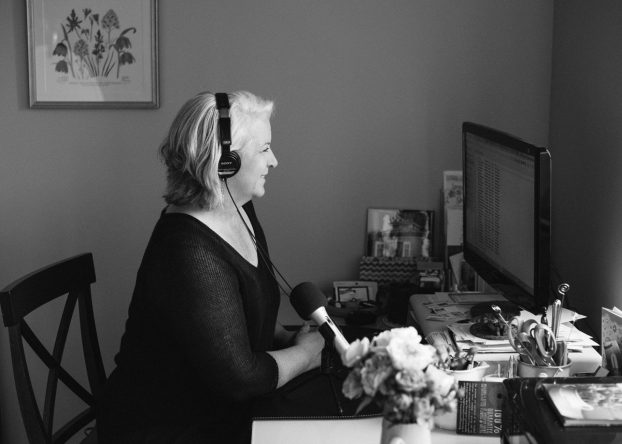
The Slow Flowers Podcast has been downloaded more than 500,000 times by listeners like you. Thank you for listening, commenting and sharing – it means so much.
I’m Debra Prinzing, host and producer of the Slow Flowers Podcast. Next week, you’re invited to join me in putting more American grown flowers on the table, one vase at a time. And If you like what you hear, please consider logging onto iTunes and posting a listener review.
The content and opinions expressed here are either mine alone or those of my guests alone, independent of any podcast sponsor or other person, company or organization.
The Slow Flowers Podcast is engineered and edited by Andrew Brenlan. Learn more about his work at soundbodymovement.com.
Music Credits: Red City Theme; Betty Dear; Gaena
by Blue Dot Sessions
http://www.sessions.bluehttps://creativecommons.org/licenses/by-nc/4.0/
Lovely by Tryad
http://tryad.bandcamp.com/album/instrumentals
http://creativecommons.org/licenses/by-sa/3.0/
In The Field Music from:
audionautix.com








